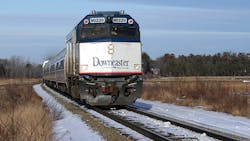Official CRISI grant tally: Passenger projects will receive more than $72.5 million in federal funding
Six passenger rail projects have been awarded more than $72.5 million in federal funding through the Consolidated Rail Infrastructure and Safety Improvements (CRISI) Program. The CRISI Program, which is administered through the Federal Railroad Administration (FRA), awarded a total of $248.5 million to 32 projects in 27 states.
“This $248.5 million federal investment will upgrade rail infrastructure and enhance safety on the tracks and at railroad crossings in rural and urban communities across America,” said U.S. Transportation Secretary Elaine L. Chao.
The CRISI Program grants help to improve the safety, efficiency and reliability of intercity passenger and freight rail systems. Rural projects, which have a minimum 25 percent funding requirement under the CRISI Program, received nearly 50 percent of the funds. Of the 32 projects that were awarded grants, 15 are in Opportunity Zones, which were created to revitalize economically distressed communities using private investments.
“These grants support the economic vitality of our nation’s rural and urban communities all around the country,” said FRA Administrator Ronald Batory.
Congressional offices impacted by the grants were notified at the beginning of March. FRA opened applications for this round of funding in August 2019.
Passenger rail projects account for just under 30 percent of the awarded grants. The following projects have been awarded funding through this round of CRISI grants:
Northern New England Passenger Rail Authority was awarded up to $16.8 million for the Wells Area Improvement Project in Maine that calls for the construction of a new intercity passenger rail platform at the Wells Transportation Center and a pedestrian bridge to access the new platform, and extends an existing two-mile Pan Am Railway siding to become a six-mile siding adjacent to the new platform in Wells, Maine.
Southern California Regional Rail Authority was awarded up to $10.7 million for the Burbank Corridor Speed and Safety Improvements Project. The project includes environmental analysis, engineering and construction between the Glendale and Burbank Junction, which is shared with Metrolink, Amtrak and Union Pacific, and the project will include Americans with Disabilities Act (ADA) compliant upgrades at the pedestrian grade crossings at two intercity passenger rail stations – Glendale and Burbank Airport South. The project also includes track and signal improvements at the Burbank Junction.
Colorado Department of Transportation in partnership with the Southwest Chief and Front Range Passenger Rail Commission was awarded $225,000 for the Southwest Chief Through-Car Service to Colorado Springs project, which supports developing a corridor service development plan to extend Amtrak’s Southwest Chief service from existing station stops at La Junta and Trinidad to Pueblo and Colorado Springs to allow connection to Amtrak’s national network and allow for social and economic benefits for Front Range communities.
Connecticut Department of Transportation was awarded up to $17.49 million for the Windsor Locks Station Improvements that will construct a new accessible and ADA-compliant intercity passenger rail station in a more central in-town location in Windsor Locks with a level boarding platform. The project will also make improvements to adjacent tracks, roadways and sidewalks, and add four quad gates to a grade crossing. The project will convert the current Windsor Locks platform station location into a maintenance-of-way facility for intercity passenger rail.
Michigan Department of Transportation was awarded up to $749,919 for the Battle Creek Connection Project. The federal grant will fund a preliminary engineering and environmental analysis and documentation for a new dedicated intercity passenger rail track in Battle Creek, Mich., to allow intercity passenger trains to bypass Canadian National track where frequent host railroad delays occur. The preliminary engineering and environmental analysis work encompasses new track, turnouts, grade crossings and the reconstruction of the intercity passenger rail boarding platform at the Battle Creek Intermodal Terminal.
Wisconsin Department of Transportation (WisDOT) was awarded up to $26.6 million for the Muskego Yard Bypass Project that will reconfigure the existing Canadian Pacific Railway (CP) rail and yard facilities just south of the WisDOT-owned Milwaukee Intermodal Station to double-track the CP’s mainline through the Muskego Yard, moving freight traffic out of the Milwaukee Intermodal Station and reducing the number of grade crossings CP freight trains cross in Milwaukee.
There were also two passenger rail-related projects to receive CRISI grants. Terminal Railroad Association of St. Louis was awarded a grant of up to $21.4 million to replace the main span trusses of the approximately 130-year-old Merchant’s Bridge, which is used by several freight railroads and Amtrak. Additionally, the Chicago Region Environmental and Transportation Efficiency Program in Illinois received a $12.9 million grant for the Pullman Junction project on Chicago’s South Side. It’s a freight-specific project, but work to unsnarl freight congestion in the Chicago region has an ancillary impact on the area’s passenger trains.
About the Author

Mischa Wanek-Libman
Group Editorial Director
Mischa Wanek-Libman is director of communications with Transdev North America. She has more than 20 years of experience working in the transportation industry covering construction projects, engineering challenges, transit and rail operations and best practices.
Wanek-Libman has held top editorial positions at freight rail and public transportation business-to-business publications including as editor-in-chief and editorial director of Mass Transit from 2018-2024. She has been recognized for editorial excellence through her individual work, as well as for collaborative content.
She is an active member of the American Public Transportation Association's Marketing and Communications Committee and served 14 years as a Board Observer on the National Railroad Construction and Maintenance Association (NRC) Board of Directors.
She is a graduate of Drake University in Des Moines, Iowa, where she earned a Bachelor of Arts degree in Journalism and Mass Communication.
